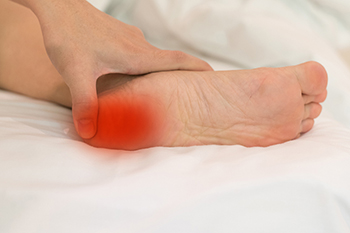
Wilmington (937) 382-2347
Fax
(513) 932-1606

Wilmington (937) 382-2347
Fax
(513) 932-1606

There is a growth plate in the heel of the foot that is known as the calcaneal apophysis. This is the area that connects the Achilles tendon and the plantar fascia to the heel. The foot condition that is known as Sever’s disease occurs as a result of excess tension on the Achilles tendon, or possibly from an injury to the heel. This generally affects children and young teenagers who participate in sporting activities. Common symptoms can include gradual heel pain, and many patients describe it as feeling like a bruise. Pain may be felt in the heel area only. Sever’s disease often develops from participating in high-impact sports such as basketball, football, or baseball. To confirm a diagnosis of Sever’s disease, a physical exam will be performed, and occasionally, an X-ray may be ordered to determine how advanced the growth plate is, in addition to observing if a stress fracture has occurred. Relief begins with temporarily stopping the activity that caused the condition, and performing specific heel stretches, which may ease the pain. If your child is affected by Sever’s disease, it is advised that a podiatrist be contacted who can begin the correct treatment process.
Sever's disease often occurs in children and teens. If your child is experiencing foot or ankle pain, see Dr. Gerald Perelman from Ohio. Our doctor can treat your child’s foot and ankle needs.
Sever’s Disease
Sever’s disease is also known as calcaneal apophysitis, which is a medical condition that causes heel pain I none or both feet. The disease is known to affect children between the ages of 8 and 14.
Sever’s disease occurs when part of the child’s heel known as the growth plate (calcaneal epiphysis) is attached to the Achilles tendon. This area can suffer injury when the muscles and tendons of the growing foot do not keep pace with bone growth. Therefore, the constant pain which one experiences at the back of the heel will make the child unable to put any weight on the heel. The child is then forced to walk on their toes.
Symptoms
Acute pain – Pain associated with Sever’s disease is usually felt in the heel when the child engages in physical activity such as walking, jumping and or running.
Highly active – Children who are very active are among the most susceptible in experiencing Sever’s disease, because of the stress and tension placed on their feet.
If you have any questions, please feel free to contact our office located in Wilmington, OH . We offer the newest diagnostic and treatment technologies for all your foot and ankle injuries.